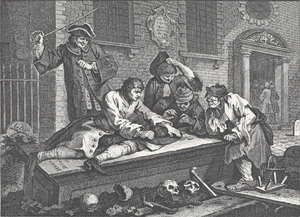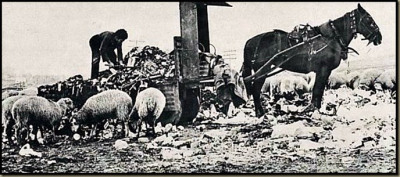El borrachito puso el muerto 23
‘Papelitos habla lengua’ es una frase recurrente del argot popular cubano, que parte de un hecho que se remonta al siglo XIX en La Habana durante la dominación española y que tuvo que ver con la aparición del cólera, la segunda mayor enfermedad que tuvo Europa, zonas de América y de Asia, sólo superada por la llamada peste negra.
En 1833 una epidemia de cólera diezmó a La Habana, la capital de la mayor isla del Caribe, la gente caía muerta en las calles y un negro bozal recibió la encomienda de recoger y llevar a los occisos al cementerio, pero en medio de la penosa tarea de traslado en un carromato, sucedio lo inesperado.
Confundido entre los cadáveres yacía un borrachíto capitalino que dormía la mona, más en el camino al camposanto la brisa despertó al curda, y como este se resistiera a ser enterrado, el negro bozal, portador de una remisión indicativa del número de fallecidos, le espetó sin miramiento: “¡23 muertos, papelitos habla lengua!”
Esta locución que deviene frase popular para los cubanos pondera que lo que realmente tiene valor es lo que aparece escrito; sin embargo no siempre es así, como manifiesta el caso del infeliz protagonista de la anédocta, tomado como el 23 en la fatídica lista, a pesar de estar vivito y coleando, aunque pasadito de tragos.
En el mundo se estima que murieron unas 10 millones de personas víctimas de la terrible pandemia y en 1883, Robert Koch, ( Klausthal, 1843 – Baden-Baden, 1910) Bacteriólogo alemán galardonado con el Premio Nobel, identificó con un microscopio el bacilo Vibrio Cholerae, causante de la enfermedad.
Este dicho parece muy popular en aquellos tiempos porque la Condesa de Merlín, en sus Cartas desde La Habana, escritas en 1840 hace mención del mismo en la XXXV al príncipe Federico de Prusia, pero usando la expresión ‘Paperito que habla lingua’.
FRASES POPULARES CUBANAS: “PAPELITOS HABLA LENGUA”.
The drunkard put the dead 23
‘Papelitos habla lengua’ is a recurring phrase of Cuban popular slang, which starts from a fact that dates back to the 19th century in Havana during the Spanish domination and had to do with the appearance of cholera, the second biggest illness in Europe. , areas of America and Asia, second only to the so-called Black Death.
In 1833 an epidemic of cholera decimated Havana, the capital of the largest island in the Caribbean, people fell dead in the streets and a black muzzle received the command to pick up and take the deceased to the cemetery, but in the middle of the painful task of transfer in a wagon, the unexpected happened.
Confused among the corpses lay a borrachíto capitalino sleeping the monkey, more on the way to the cemetery the breeze woke the Kurd, and as this one resisted to be buried, the black muzzle, bearer of a referral indicative of the number of deaths, snapped without regard: “23 dead, papelitos habla lengua!”
This phrase that becomes popular phrase for Cubans ponder that what really has value is what appears written; However, this is not always the case, as the case of the unhappy protagonist of the anecdote, taken as the 23rd on the fateful list, despite being alive and kicking, even though it is a drink.
In the world, an estimated 10 million people died of the terrible pandemic and in 1883, Robert Koch, (Klausthal, 1843 – Baden-Baden, 1910) German bacteriologist awarded with the Nobel Prize, identified with a microscope the Vibrio bacillus Cholerae, cause of the disease.
This saying seems very popular in those times because the Countess of Merlin, in her Letters from Havana, written in 1840, mentions it in the XXXV to Prince Frederick of Prussia, but using the expression ‘Paperito that speaks lingua’.
Agencies/Arrajatabla/Alberto Denis/Internet Photos/ Arnoldo Varona/ TheCubanHistory.com
THE CUBAN HISTORY, HOLLYWOOD.






